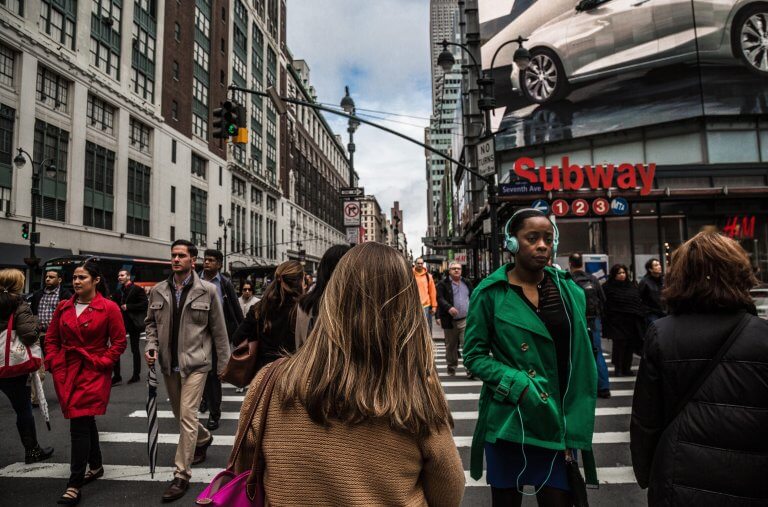Fast Food and Psychology
We live in the age of speed.
Of instantaneity.
Of not being able to stand the delay of a screen when we click.
Of needing solutions here and now.
We live in the age of globalization and being connected. The age of finding out what’s happening on the other side of the world as soon as we get out of bed and having shopping, car insurance, your record, or CV just a click away.
When something hurts, we take paracetamol. If we want to lose weight, we search on Google for the fastest diets in the galaxy to lose weight. If I write to the person I would like to meet, I need to know if we will see each other and read a response immediately. Well, or check the blue tick just in case we’ve been ignored.
We live so fast, with such haste, and the need to have everything here, now, and easy that we don’t hesitate to buy in the most voracious way from large chains, instead of going to the local lady’s shop.
Who would want to spend two hours in the whole process of buying and cooking a hamburger when you can have it for a simple euro, in a paper bag, and with a napkin included at some fast-food chain?
What’s happening with psychology
The pandemic and the changes our society has experienced in recent years are leaving scars. The adoption of new technologies in our routine, along with all the problems derived from Covid-19 (among other factors), have opened Pandora’s box: our mental health is in great danger lately.
And obviously, we have to do something.
Mental Health begins to be a topic of conversation (and thankfully so). We are concerned about normalizing mental health problems, Twitter and Instagram have been filled with hashtags reminding us that there is no health without mental health. It’s even mentioned from the government that there might be a specific plan to help the population take care of their psychological well-being.
In short, the current context is the ideal breeding ground for the need that has been talked about in recent months: to have accessible mental health solutions for the population.
And these solutions, obviously, will go hand in hand with all the changes and advances that characterize the last decade.
Order of priorities

“Shopping at the nearby store is expensive, I always go to the supermarket”
“All my clothes are from large chains, I don’t have anything artisan or from small businesses”
“Changing my way of understanding food and the way I relate to it is too long a process. I’m going to try the diet a friend told me about that she lost 5 kg in a week.”
“I don’t have time to go to the gym, I’m too busy with my job (even though I spend on average two hours every day passively on my social networks)”
“The psychologist is expensive (but the latest generation smartphone is not)”
Nobody finds it strange to pay an average of 100 euros when they go to a specialist consultation. Really, we already know what we are getting into when we go to a professional that public health does not cover. Undoubtedly, mental health should be a right, and in a fairer scenario than the one we live in, we would all have access to a psychologist without waiting between 6 and 8 months for a 20-minute appointment in public health.
But the reality right now is different. In the field of clinical psychology, if we focus on the average price of a therapy session, it usually ranges around 50-60 euros per session.
In that session, we pay for the training, experience, knowledge, means and tools, the time, and the characteristics of a professional in this field.
What happens when the price to pay, behind the mask of making it accessible, is much lower?
And when the one receiving that money is not directly the person (who only perceives a percentage), but an intermediary?
Cheap, sometimes is expensive
In the field of psychology, costs can only be cut in two ways to lower the price of the product.
The first is to cut back on resources of time, quality, or means (for example, offering shorter sessions, without the need for face-to-face meetings and therefore without rental expenses for an office, with people of low training and/or experience, or without offering a previous assessment through official evaluation tools.
The second, if you do not work independently, is by paying little to the professionals who work for you.
In both cases, the result is the same: the quality of care dangerously drops.
Whether it’s because the professional is not well paid, or because we’ve cut back on means and lowered our hiring standard, the patient will always be the most harmed.
And this is very dangerous. Because mental health is not something to be taken lightly or trivialized. Because a bad experience with a psychologist can condition a person’s life, not only the course of a problem but also the likelihood of that individual seeking psychological help again.

That’s why psychology should not be turned into a fast food product. Because a 1 euro hamburger will never have the quality of a butcher’s hamburger.
Because a service that is normally charged at an average price, cannot be sold for half without cutting back on something.
Would you buy a car that they tell you is new and quality, but costs 200 euros? No, because you know it’s not possible to offer that price if the car is new, safe, and works. And if not, it could endanger your life
Because even though we live in a globalized world and have adopted a more comfortable way of living, this comfort should never come before our health or put it at risk.
For accessible, but quality mental health.











